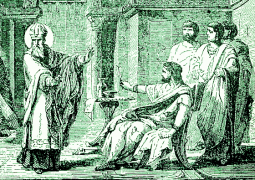Lives of the Saints
Our Models and Protectors
Spiritual Bouquet:
February 25

Saint Tarasius
Patriarch of Constantinople
(750-806)
Tarasius was born at Constantinople in the middle of the eighth century, of a noble family. His mother, Eucratia, brought him up in the practice of the most eminent virtues. By his talents and virtue he gained the esteem of all, and was raised to the greatest honors of the empire, made first a Consul and afterwards first Secretary of State to the Emperor Constantine IV and the Empress Irene, his mother. In the midst of the court and in its highest honors, he led a life like that of a religious.
Tarasius was chosen, by the unanimous consent of the court, clergy and people to succeed to the Patriarch of Constantinople. Saint Tarasius declared that he could not in conscience accept the government of a see which had been cut off from the Catholic communion — which had occurred through the fault of his predecessor, who afterwards recognized his error in approving a group of dissidents — except on condition that a general Council be convoked to settle the dispute concerning holy images, which was dividing the Church at that time. This being agreed to, he was solemnly declared Patriarch, and consecrated soon afterwards, on Christmas Day.
The Council was opened on the 1st of August, 786, in the Church of the Apostles at Constantinople; but, being disturbed by the violences of the Iconoclasts, it adjourned, to meet again the following year in the Church of Saint Sophia at Nicea. The Council declared the positive thought of the Church in relation to the matter under debate, which was whether or not holy pictures and images should be allowed a relative honor. Afterwards synodal letters were sent to all the churches, and in particular to the Pope, who approved the council.
The life of the holy Patriarch Tarasius was a model of perfection for his clergy and people. His table contained barely the necessaries of life; he allowed himself very little time for sleep, rising the first and retiring last in his spiritual family. Reading and prayer filled all his leisure hours.
After the Emperor repudiated his legitimate wife and, with the collaboration of a servile priest, married a servant whom he had crowned as Empress in her place, he used all his efforts to gain the Patriarch of Constantinople over to his desires. Saint Tarasius resolutely refused to countenance the iniquity, even when imprisoned by the irritated monarch. Soon afterwards, the emperor lost his empire and his life, having spurned the reproaches of Saint Tarasius. The holy man gave up his soul to God in peace after governing his church for twenty-two years in great purity of life, on the 25th of February, 806.
Reflection. The highest praise which Scripture pronounces on the holy man Job consists in these words, He was simple and upright.
*On leap years, the feast day of this Saint is celebrated on February 26.
Les Petits Bollandistes: Vies des Saints, by Msgr. Paul Guérin (Bloud et Barral: Paris, 1882), Vol. 3; Little Pictorial Lives of the Saints, a compilation based on Butler's Lives of the Saints and other sources by John Gilmary Shea (Benziger Brothers: New York, 1894)